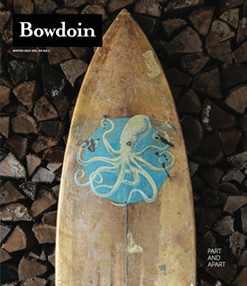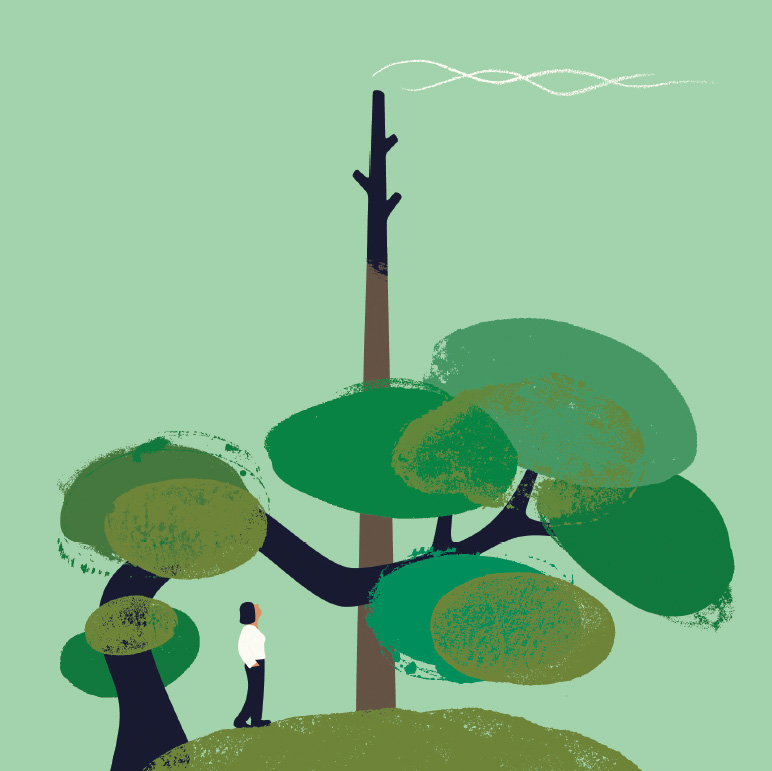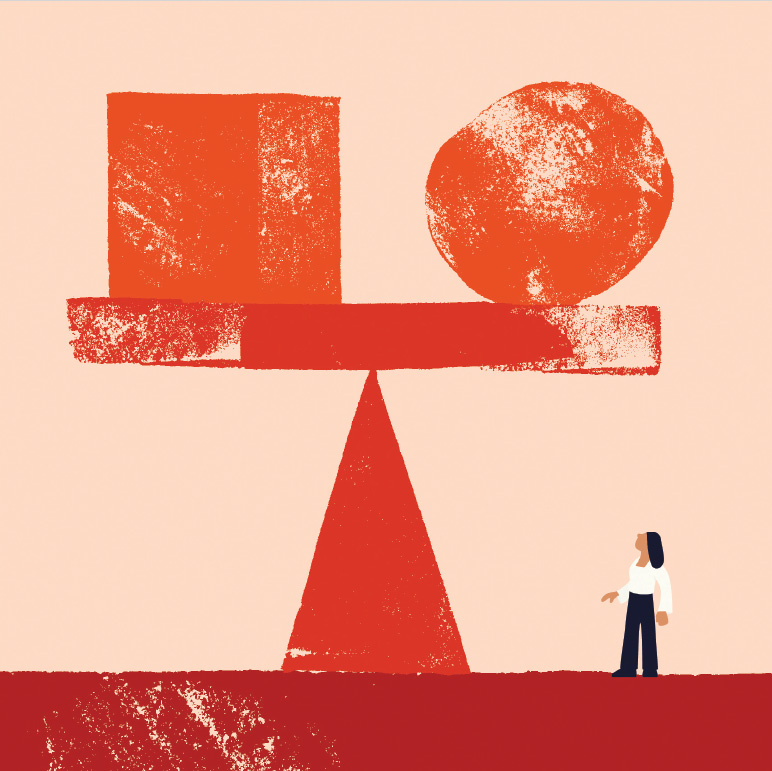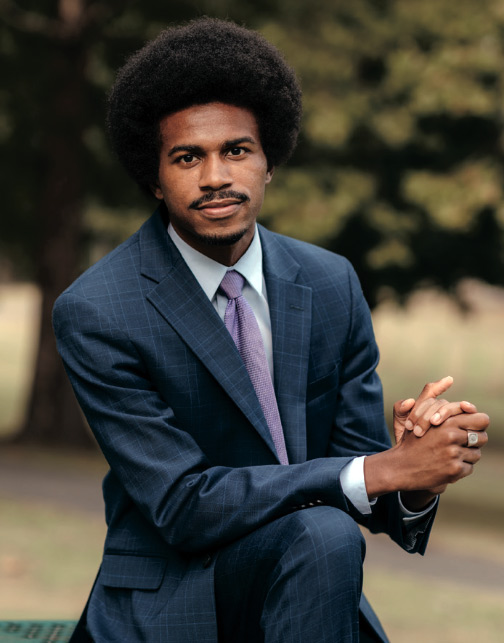Bound Together
By Justin J. Pearson ’17 for Bowdoin MagazineState representative Justin J. Pearson ’17 talks about the need for humility in public service, how it is key to the development of the common good, and how its lack impairs our path to justice and equity.

“Don't forget where you come from, Justin. Don’t forget the goodness of God. Don’t forget the people and the places that made you, so you can use the opportunities you’ve had to do good for others.” These are the words of my grandmothers, my mother and father, my neighbors, and the constituents in District 86 that I represent in the Tennessee General Assembly.
I grew up watching my parents exemplify humility. In the latter part of my childhood, they moved our family to a more affluent area of the country for their continuing education. We gained access to educational opportunities and experiences we did not have before.
Then, they moved us all back home to Memphis, where our grandmothers lived, where four generations of our family developed wisdom through struggle. And back to where my grandmothers, who both succumbed to cancer caused by environmental racism due to seventeen toxic facilities surrounding their homes, had built the foundations of our family.
They moved us home where humility forged the bonds of trust and grew the webs of interconnectedness between all of us. They brought us back to where we came from, so that they—one a teacher and one a preacher—could humbly serve in their hometown.
Most of us instinctively value the idea of humility. We recognize the relationship between being humble and having compassion for others. We understand that it is only through accepting our limitations that we can recognize what we have to learn from others. In this way, we may serve the common good rather than the privileged few of a society built on profit and white supremacy.
The ancient Greek philosophers Socrates and Plato identified humility as a virtue among virtues. Not only as a moral virtue, as we think of it today, but also as an intellectual one. While we need to understand and acknowledge our limitations as human beings, we also need enough self-reflection to recognize our own intellectual ignorance.
Most spiritual traditions also teach us the value of humility. Buddhism, for example, sees humility as a virtue that guards against arrogance. Arrogance, or ego-centeredness, impedes compassion for others.
The Christian Bible teaches that humility is respect for ourselves and others, and requires putting love for others over love for self. Christian scripture also teaches (Proverbs 11:2) that humility is necessary for wisdom: “Pride leads to disgrace, but with humility comes wisdom.” We learn in Matthew of its necessity for leadership, when Christ says, “Whoever wants to be a leader among you must be your servant.” Humility is a necessary attribute for good and proximate leadership.
Islamic teachings espouse that humility is the root of all the virtues. Jewish teachings hold that humility is understanding one’s strengths and weaknesses so that one may cooperate rather than compete.
In a country as polarized as ours, the very humility that is needed to wisely cooperate for the common good is the very value that is lacking among too many of our political leaders. Their minds are closed to all but their own self-serving agendas.
I’ve experienced this firsthand on the floor of the Tennessee General Assembly over the past year.
What we need instead—in Tennessee and the nation—is the cooperation, connection, and common good that can only come with humility.
My fellow Tennessee state representatives Justin Jones and Gloria Johnson joined together with me to acknowledge the wisdom of the people we represented—and the hard data— to call for common sense gun safety laws in the wake of the horrific massacre of three of Nashville’s Covenant School children and three staff members in March 2023. Our solidarity protest in the Well of the Tennessee General Assembly was broadcast around the country and across the globe. As was the subsequent expulsion of Representative Jones and me from office by republican lawmakers—and our ultimate reinstatement by our voters.
The power and knowledge we have as leaders come not only from the facts and science but also from “those who made us”—from our communities and our constituents. It also comes from those who are most marginalized, from those who suffer most from unjust policies that serve only the powerful. Only by understanding their wisdom and experiences can we bridge political divides and represent everyone.
Lacking humility and the wisdom it brings, some lawmakers in the Tennessee General Assembly refused to learn from affected constituents and hard data about gun violence. Some even doubled down on this hubris by proposing to vastly increase the presence of guns in our schools. Their proposals ignored the studies that show arming teachers and civilians increases the risks of gun violence in schools. Instead, they chose to align with the interests of eighty-two reported gun manufacturing facilities in our state.
In a similar display of self-serving hubris, one conservative lawmaker pronounced on the House floor that climate change isn’t real and that fossil fuels are a clean and renewable source of energy. Not only are both statements demonstrably false and contrary to all scientific evidence, the lack of humility present in these proclamations exposes the dangers of policies that protect only the powerful—in this case the fossil fuel industry—at the expense of truth and justice for the rest of us.
Politicians like these who demonstrate arrogance and ignorance exemplify the antithesis of humility. Their ideology is asserted in direct contrast with fact. Their policies serve to pit our basic human rights and needs against the agendas of corporate profit.
What we need instead—in Tennessee and the nation—is the cooperation, connection, and common good that can only come with humility.
A persistent challenge that should be addressed with humble leadership is poverty. There are about 2 million poor and low-income voters in Tennessee, and nearly one-quarter of Tennessee’s households with children reported “sometimes or often not having enough to eat the previous week.” And well over half of all Tennesseans in 2022 reported hardship in meeting basic living expenses.
These statistics are significantly worse than the national averages. According to the Tennessee Commission on Children and Youth’s State of the Child 2022 report, more than a quarter of our households spent more than 30 percent of their monthly income on housing. Among low-income residents, this number skyrockets to three out of four households.
This reality should humble any policymaker and spur them to action. But for the majority of our state’s lawmakers, it doesn’t. They lack the humility necessary for true democracy that works for the well-being of all of us.
Born near the Tennessee border in Kentucky in the 1950s, the Black feminist, social activist, and prolific author bell hooks speaks powerfully about the relationship between love, humility, and liberation. She says in her book All About Love, “When the politics of greed become a cultural norm, all acts of charity are wrongly seen as suspect and are represented as a gesture of the weak.”
When politicians characterize the wisdom of the most marginalized as weakness and the enrichment of the already powerful as the ultimate goal of a society, we lose connection. We lose love. We lose justice.
We must find our way back. A good place to start is with the value from which all other values flow—humility.
This is one in a series of four essays about humility, published in Bowdoin Magazine.
Public servant and activist Justin J. Pearson earned a degree in government and legal studies and education in 2017. He is a member of the Tennessee House of Representatives from the 86th district.
Francesco Ciccolella is an illustrator, graphic artist, and visual storyteller based in Vienna, Austria. His work has been featured in many publications, including The New York Times and The New Yorker. See more of his art at francescociccolella.com.

This story first appeared in the Winter 2024 issue of Bowdoin Magazine. Manage your subscription and see other stories from the magazine on the Bowdoin Magazine website.






